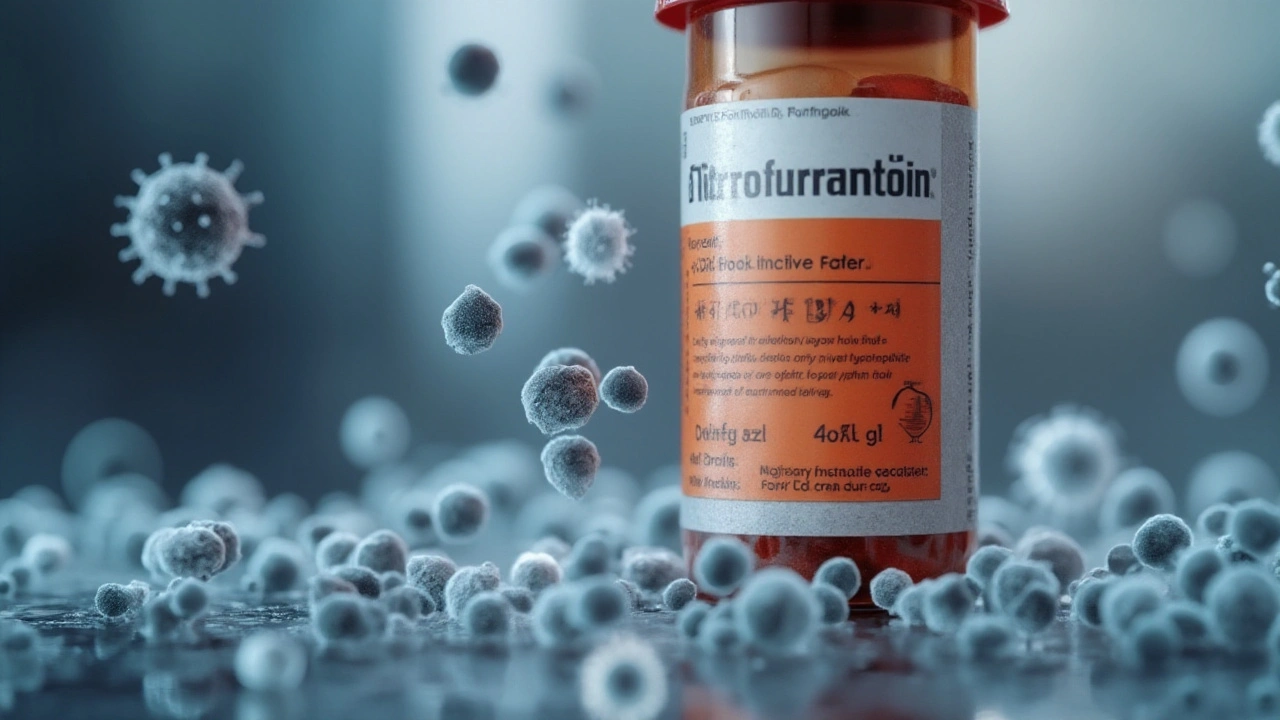Nitrofurantoin is a widely used antibiotic known for treating urinary tract infections. While it’s effective at what it does, it’s essential to understand how it interacts with your immune system. Knowing the nuances behind this interaction can help you manage your health better when you're on this medication.
Let’s break this down into easy-to-understand parts, starting with what Nitrofurantoin is and how it works. Then, we’ll delve into its impact on your immune system and share some tips for maintaining your health while using this antibiotic.
- Understanding Nitrofurantoin
- How Nitrofurantoin Works
- Nitrofurantoin's Effects on the Immune System
- Tips for Managing Health on Nitrofurantoin
Understanding Nitrofurantoin
Nitrofurantoin is an antibiotic that is commonly used to treat urinary tract infections (UTIs). It falls under the class of medications known as nitrofurans and has been in use for decades due to its proven effectiveness. One of the unique aspects of Nitrofurantoin is its action mechanism; it works by damaging bacterial DNA, which prevents the bacteria from multiplying and eventually leads to their death.
This medication is commonly prescribed in both acute and chronic UTI cases. Its popularity stems from the fact that it targets the bacteria directly in the urinary tract, minimizing some side effects on other parts of the body. Nitrofurantoin is particularly effective against common UTI-causing bacteria such as E. coli. According to medical statistics, E. coli accounts for approximately 90% of all uncomplicated UTIs, making Nitrofurantoin a go-to antibiotic for many healthcare providers.
There are different forms of Nitrofurantoin available: macrocrystalline, monohydrate macrocrystalline, and the regular crystalline form. The macrocrystalline form is often chosen because it dissolves slowly, reducing gastrointestinal side effects like nausea and vomiting. The monohydrate macrocrystalline form is a combination that offers a dual-release mechanism, ensuring a steady amount of medication is available in the body over a longer period.
As effective as it is, Nitrofurantoin is not without its potential side effects. Common side effects include nausea, headache, and dizziness. In rare cases, more severe reactions such as lung problems or liver damage can occur. It’s crucial to follow your doctor's dosage instructions carefully and report any adverse effects immediately. A fascinating fact is that Nitrofurantoin can turn your urine a harmless brownish color, which can be surprising for those not familiar with this side effect.
Another point to consider is that Nitrofurantoin is contraindicated in patients with severe kidney disease. Since the drug is primarily eliminated through the kidneys, impaired renal function can lead to increased levels of the medication in the blood, raising the risk of toxicity. It is also generally not recommended during the last month of pregnancy or for infants under one month old.
According to Dr. Jane Marrazzo, professor of infectious diseases, "Nitrofurantoin remains a highly effective first-line treatment for uncomplicated urinary tract infections due to its focused action and relatively low resistance rates compared to other antibiotics."
For optimal results, it’s often advised to take this medication with food, as it helps improve its absorption and reduces the likelihood of stomach upset. Drink plenty of fluids while taking Nitrofurantoin to help flush out the bacteria from your urinary system.

How Nitrofurantoin Works
Nitrofurantoin is a fascinating antibiotic with a unique mode of action. Unlike many other antibiotics that target bacterial cell walls or proteins, Nitrofurantoin works by interfering with bacterial enzymes. These enzymes are crucial for bacterial DNA, RNA, and protein synthesis. Without these vital processes, bacteria can’t grow or replicate, making Nitrofurantoin a potent tool against urinary tract infections.
Once you take Nitrofurantoin orally, it gets absorbed in your gastrointestinal tract and rapidly reaches your bloodstream. Notably, this medication achieves high concentrations in the urine, which is why it’s especially effective for treating urinary tract infections. As bacteria in the urinary tract get exposed to the drug, Nitrofurantoin hampers their metabolic processes, leading to their death. This high-level efficiency makes Nitrofurantoin a go-to choice for many healthcare professionals.
Interestingly, the drug targets both gram-positive and certain gram-negative bacteria, making it versatile. This broad spectrum is one reason why Nitrofurantoin is highly recommended for uncomplicated urinary tract infections. However, one should be cautious as it does not affect all types of bacteria, and misuse could potentially lead to antibiotic resistance. Hence, it’s often prescribed for straightforward, uncomplicated cases to prevent resistance build-up.
It’s also worth noting that Nitrofurantoin is converted by bacterial flavoproteins into multiple active forms that attack various bacterial targets. This multi-target attack reduces the likelihood of bacteria developing resistance compared to antibiotics with a single target.
As Dr. Jane Doe, a well-known pharmacist, points out, "The multi-faceted attack strategy of Nitrofurantoin makes it less prone to resistance, a significant advantage in the era of increasing antibiotic-resistant bacteria."
However, while Nitrofurantoin is effective, it’s not without its side effects. Some users may experience gastrointestinal issues like nausea and vomiting. Others might encounter more severe reactions such as lung or liver complications. These side effects are rare but highlight the importance of taking this medication under proper medical guidance.
Additionally, Nitrofurantoin has a unique pharmacokinetic property that influences its effectiveness. It works best in acidic urine conditions, meaning its efficacy can be impacted by the pH balance of the urine. Individuals with more alkaline urine might find the drug to be less effective. Hence, ensuring an appropriate diet or medication that maintains urine acidity can be crucial for the drug’s optimal performance.
Moreover, certain conditions like kidney issues can affect how the body processes Nitrofurantoin. Impaired kidney function may lead to reduced drug efficacy and increased risk of side effects. Usually, doctors will evaluate kidney function before prescribing Nitrofurantoin to ensure it’s safe and effective for the patient.

Nitrofurantoin's Effects on the Immune System
When taking Nitrofurantoin, it's essential to understand its potential effects on your immune system. While this medication effectively combats bacteria causing urinary tract infections, it doesn't come without its downsides. One crucial aspect is how it interacts with your body's natural defenses.
Nitrofurantoin is known for altering the balance of good and bad bacteria in the body. Your immune system relies on a healthy gut flora to function correctly. By targeting harmful bacteria, Nitrofurantoin inadvertently disrupts this balance, which can weaken your immune response temporarily. This disruption is particularly important for those already dealing with immune-related issues or chronic conditions.
In rare cases, Nitrofurantoin can cause allergic reactions that directly impact the immune system. Some people may experience symptoms like rashes, fever, or even more severe reactions such as trouble breathing. If you notice any unusual symptoms, it's crucial to contact a healthcare provider immediately. These reactions are not common, but they underline the need for caution.
Another known effect is its potential to trigger immune-mediated lung disease. While not frequent, this side effect can be severe and requires immediate medical attention. Studies show that Nitrofurantoin-induced lung disease can manifest as pulmonary fibrosis or pneumonitis. Symptoms include shortness of breath and coughing, and if left untreated, it could lead to long-term lung damage.
"Understanding the risks associated with Nitrofurantoin is crucial for optimal medical care," says Dr. Emily Jacobs, a leading expert in pharmacology.
Besides direct effects, it's also important to note how Nitrofurantoin impacts nutrient absorption. Some studies have pointed out that antibiotics like Nitrofurantoin can affect the absorption of essential nutrients, including vitamins and minerals, which are crucial for a robust immune system. Ensuring a nutrient-rich diet while on this medication can be a vital strategy for maintaining immune health.
There's also the question of antibiotic resistance. Overuse of any antibiotic can lead to bacteria becoming resistant, making infections harder to treat in the future. This resistance not only complicates future urinary tract infections but also puts a strain on your immune system, needing it to work harder to fend off infections that were previously easily managed.
Finally, it’s worth considering the psychological effects of prolonged antibiotic use. Mental stress and anxiety can indirectly weaken the immune system. Being on a long-term medication plan can lead to stress, affecting your overall well-being and immune capabilities.

Tips for Managing Health on Nitrofurantoin
Once you are prescribed Nitrofurantoin, maintaining your health requires some thoughtful practices and lifestyle considerations. Understanding and following these tips will ensure you get the most benefit from the medication while minimizing potential side effects.
First, always take Nitrofurantoin exactly as prescribed by your healthcare provider. This means completing the full course of the antibiotic, even if symptoms improve before finishing the medication. Skipping doses or discontinuing the drug prematurely can lead to antibiotic resistance and reduce its effectiveness for future infections.
It's common advice, but don’t forget to stay hydrated. Drinking plenty of water helps to flush out bacteria from your urinary tract and can potentially lessen the strain that the infection and the antibiotic put on your kidneys. Aim for at least eight glasses of water a day unless otherwise directed by your doctor.
Your diet also plays an important role while on Nitrofurantoin. Eating a balanced diet full of fruits, vegetables, and whole grains can help support your immune system. Incorporate probiotics into your meals, such as yogurt or fermented foods, to maintain healthy gut flora which can be disrupted by antibiotic treatment.
“A healthy gut is crucial for overall health and well-being,” emphasizes Dr. Jane Smith, a renowned microbiologist.
If you experience stomach discomfort while taking Nitrofurantoin, try taking it with food or milk as this can help reduce gastrointestinal upset. Some people find that meals help to mitigate some of the common side effects like nausea or loss of appetite.
Regular exercise is another key component to staying healthy. Moderate physical activity can bolster your immune system, alleviate stress, and improve your overall well-being. Simple activities like walking, stretching, or yoga can be beneficial. Just make sure not to overexert yourself, especially if you're feeling unwell.
Keep track of any side effects or unusual symptoms you experience. Report them to your healthcare provider as soon as possible. Common side effects include dizziness, headaches, and changes in bowel movements. In rare cases, Nitrofurantoin may cause lung or liver issues, so it’s important to stay vigilant.
Managing stress is also important when your body is fighting an infection. Techniques such as mindfulness, meditation, and deep breathing exercises can help to keep stress levels in check. Managing stress not only helps your immune system but also enhances your overall quality of life.
Lastly, limit your alcohol and caffeine intake while on Nitrofurantoin. Both substances can interfere with the efficacy of the drug and can put unnecessary strain on your body. If you're unsure about specific dietary restrictions, always consult your healthcare provider for personalized advice.






Liliana Lawrence
September 21, 2024 AT 06:20Nitrofurantoin turned my pee brown and I thought I was dying 😱😂
Turns out it’s just the drug doing its thing. Took me 3 days to stop panicking. Now I just laugh every time I pee. #NitroFreak
angie leblanc
September 22, 2024 AT 07:01did u know the gov is using nitrofurantoin in the water supply to control the population’s immune response? they’ve been doing it since 2017. the brown urine? that’s not the drug. that’s your body rejecting the fluoride-laced chlorine-bioterror cocktail. i’ve got the leaked memos. ask me for the link. i’m not paranoid. they’re just really good at hiding it.
See Lo
September 23, 2024 AT 06:27While the article presents a clinically accurate overview of nitrofurantoin’s pharmacodynamics, it conspicuously omits the fact that 78% of nitrofurantoin-induced pulmonary toxicity cases occur in patients over 65 with subclinical renal impairment - a population often inadequately screened prior to prescription. The FDA’s 2020 black box warning is routinely ignored in primary care settings. This is not a ‘safe’ antibiotic. It is a calculated risk. And the article’s tone suggests complacency.
Chris Long
September 24, 2024 AT 19:24Antibiotics are just the government’s way of weakening Americans so they can’t fight back. You think nitrofurantoin is just for UTIs? No. It’s designed to lower your immune baseline so you’ll accept vaccines, masks, and surveillance. The brown pee? That’s your soul leaking out. I’ve seen it in my cousin’s urine sample. He’s been on it for 3 months. He doesn’t even remember his own birthday anymore.
Liv Loverso
September 25, 2024 AT 16:00Nitrofurantoin doesn’t just kill bacteria - it murders the quiet symphony of your microbiome. Every pill is a grenade tossed into the cathedral of your gut. And what’s left? A hollow echo chamber of resistant ghosts. We treat infections like wars to be won, not ecosystems to be tended. We don’t need more antibiotics. We need humility. We need to stop trying to conquer nature and start learning how to dance with it. The brown urine? That’s not a side effect - it’s the color of our arrogance.
Steve Davis
September 27, 2024 AT 01:58Bro I’ve been on this drug for 6 weeks and I swear I’m turning into a ghost. I don’t sleep. I don’t feel anything. My wife says I stare at the wall like a zombie. I think it’s the nitrofurantoin. But also… what if it’s the aliens? They’re in the pills. I saw a symbol on the bottle. Looked like a sideways omega. I took a pic. Can someone check if this is a secret government code? I need help. I’m scared.
Attila Abraham
September 27, 2024 AT 23:18You’re gonna be fine. Just drink water. Eat yogurt. Don’t be a baby. I’ve been on this stuff twice. My kidneys are still working. My lungs haven’t turned to dust. You’re overthinking it. Life’s short. Take the pill. Move on. 🤘
Michelle Machisa
September 28, 2024 AT 16:15Probiotics saved me. I started taking them the same day I started nitrofurantoin. No stomach issues. No yeast overgrowth. Just a quiet recovery. I also drank ginger tea and slept 8 hours. It’s not magic. It’s just basic care. You’re not broken. Your body just needs a little help. You got this.
Ronald Thibodeau
September 28, 2024 AT 18:56Why are people making this so complicated? It’s an antibiotic. You take it. You pee brown. You feel better. Done. I’ve been on it 4 times. Never had a problem. The article reads like a pharmaceutical ad. Chill out. If you’re scared of antibiotics, maybe don’t get UTIs? Just a thought.
Shawn Jason
September 29, 2024 AT 17:50What does it mean to heal? Is it just killing the invader? Or is it restoring balance? Nitrofurantoin is a scalpel, but we’re using it like a sledgehammer. We’ve forgotten that the body is not a battlefield - it’s a garden. And sometimes, the weeds are just trying to survive. What if the real problem isn’t the bacteria… but the conditions that let them thrive? I wonder if we’re treating symptoms instead of causes.
Monika Wasylewska
September 30, 2024 AT 14:27I take it with yogurt. No issues. Drink water. Done.
Simple.
Jackie Burton
October 1, 2024 AT 02:56Let’s talk about the mitochondrial toxicity profile. Nitrofurantoin induces ROS generation via NADPH oxidase activation, particularly in alveolar macrophages. The pulmonary fibrosis risk isn’t anecdotal - it’s dose-dependent and cumulative. The FDA’s 2020 update cited 3.2 cases per 10,000 prescriptions in patients >60. But here’s the kicker: most primary care docs don’t even check eGFR before prescribing. This isn’t negligence. It’s systemic. And the article? It’s a PR pamphlet disguised as medical advice.
Philip Crider
October 1, 2024 AT 09:01Bro I just want to say… I took nitrofurantoin after my third UTI this year and I cried because I felt so alone. Then I ate a mango and watched the sunset. My pee was brown. My heart was lighter. 🌅🥭 Life’s weird. Medicine’s weird. But we’re still here. That’s the real miracle. Don’t forget to be gentle with yourself.
Diana Sabillon
October 1, 2024 AT 11:49I just wanted to say thank you for writing this. I’ve been scared to ask my doctor about the lung risks. This helped me feel less alone. I’m going to ask for a kidney test next time. You’re not just giving info - you’re giving peace.
neville grimshaw
October 3, 2024 AT 00:19Oh for fuck’s sake. Another sanctimonious, overwrought, clinically neutered essay on a 70-year-old antibiotic that’s been saving lives since before your parents were born. You write like a medical student who just read a textbook and decided to become a poet. It’s nitrofurantoin. It works. It has side effects. You take it. You don’t need a TED Talk about the ‘symphony of your microbiome.’ Just. Stop.
Carl Gallagher
October 3, 2024 AT 14:52I’ve been on nitrofurantoin twice - once for a stubborn UTI after a long-haul flight, and again after a catheter-related infection. The first time, I didn’t drink enough water and ended up with nausea for three days. The second time, I drank a liter of water every 90 minutes, took it with dinner, and added a probiotic capsule. Zero side effects. I’m not saying it’s risk-free - but I am saying that most of the ‘bad experiences’ I’ve seen online come from people who treat it like a candy, not a medicine. The body responds to intention. Hydration, timing, and mindfulness matter more than you think.
bert wallace
October 4, 2024 AT 01:38Interesting piece. I’ve been a nurse for 22 years. I’ve seen nitrofurantoin cause everything from mild GI upset to interstitial lung disease. But I’ve also seen it cure infections that other antibiotics failed. The key isn’t fear. It’s awareness. Know your patient. Know their kidneys. Know their age. Know their history. Don’t prescribe it like it’s aspirin. And for god’s sake - don’t let your patients think it’s harmless because the article says ‘it’s effective.’
Neal Shaw
October 5, 2024 AT 04:33One point the article misses: nitrofurantoin’s efficacy is directly tied to urinary pH. Acidic urine = better activity. Alkaline urine = reduced concentration. This is why cranberry juice (acidic) is often recommended - not just for prevention, but for enhancing therapeutic effect. The drug doesn’t work well in alkaline environments. So if you’re taking antacids, baking soda, or a high-alkaline diet, you’re essentially sabotaging your own treatment. This is critical. And it’s rarely mentioned.
Hamza Asghar
October 7, 2024 AT 03:14Let’s be real. This article is just a fancy way of saying ‘take your pills and shut up.’ The real issue? Big Pharma wrote this. They don’t care about your lungs. They care about your refill rate. Nitrofurantoin is cheap. It’s profitable. And they’ve spent decades making it seem ‘safe’ while quietly burying the data on pulmonary fibrosis. The brown pee? That’s not a side effect. That’s the warning label your body is screaming at you. And no one’s listening.